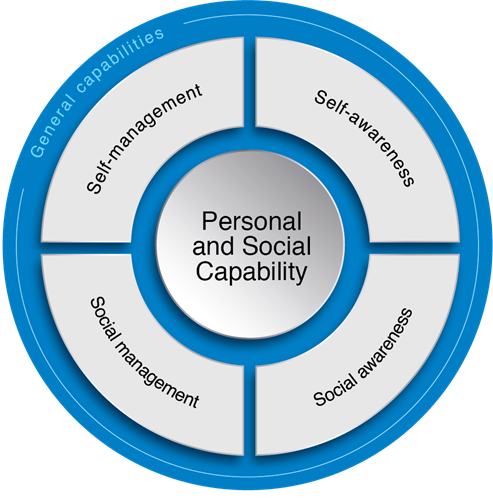Organising elements
The Personal and social capability learning continuum is organised into four interrelated elements of:
- Self-awareness
- Self-management
- Social awareness
- Social management
The diagram below sets out these elements.

This element involves students in identifying and describing the factors that influence their emotional responses. They develop a realistic sense of their personal abilities, qualities and strengths through knowing what they are feeling in the moment, and having a realistic assessment of their own abilities and a well-grounded sense of self-knowledge and self-confidence. Self-awareness involves students reflecting on and evaluating their learning, identifying personal characteristics that contribute to or limit their effectiveness, learning from successes or failures, and being able to interpret their own emotional states, needs and perspectives. In developing and acting with personal and social capability, students:
- recognise emotions
- recognise personal qualities and achievements
- understand themselves as learners
- develop reflective practice.
This element involves students in effectively regulating, managing and monitoring their own emotional responses, and persisting in completing tasks and overcoming obstacles. Students are engaged in developing organisational skills, and identifying the resources needed to achieve goals. This is achieved through developing the skills to work independently and to show initiative, learning to be conscientious, delaying gratification and persevering in the face of setbacks and frustrations. It also involves the metacognitive skill of learning when and how to use particular strategies. In developing and acting with personal and social capability, students:
- express emotions appropriately
- develop self-discipline and set goals
- work independently and show initiative
- become confident, resilient and adaptable.
This element involves students recognising others' feelings and knowing how and when to assist others. Students learn to show respect for and understand others' perspectives, emotional states and needs. They learn to participate in positive, safe and respectful relationships, defining and accepting individual and group roles and responsibilities. Students gain an understanding of the role of advocacy in contemporary society and build their capacity to critique societal constructs and forms of discrimination, such as racism and sexism. In developing and acting with personal and social capability, students:
- appreciate diverse perspectives
- contribute to civil society
- understand relationships.
This element involves students in interacting effectively and respectfully with a range of adults and peers. Students learn to negotiate and communicate effectively with others; work in teams, positively contribute to groups and collaboratively make decisions; resolve conflict and reach positive outcomes. Students develop the ability to initiate and manage successful personal relationships, and participate in a range of social and communal activities. Social management involves building skills associated with leadership, such as mentoring and role modelling. In developing and acting with personal and social capability, students:
- communicate effectively
- work collaboratively
- make decisions
- negotiate and resolve conflict
- develop leadership skills.
